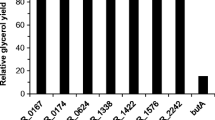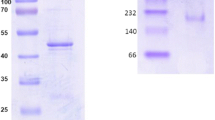Abstract
NAD+-dependent propan-1-ol and propan-2-ol dehydrogenase activities were detected in cell-free extracts of Rhodococcus rhodochrous PNKb1 grown on propane and potential intermediates of propane oxidation. However, it was unclear whether this activity was mediated by one or more enzymes. The isolation of mutants unable to utilize propan-1-ol (alcA-) or propan-2-ol (alcB-) as sole carbon and energy sources demonstrated that these substrates are metabolized by different alcohol dehydrogenases. These mutants were also unable to utilize propane as a growth substrate indicating that both alcohols are intermediates of propane metabolism. Therefore, propane is metabolized by terminal and sub-terminal oxidation pathways. Westernblot analysis demonstrated that a previously purified NAD+-dependent propan-2-ol dehydrogenase (Ashraf and Murrell 1990) was only synthesized after growth on propane and sub-terminal oxidation intermediates (but not acetone), and not propan-1-ol or terminal oxidation intermediates. Therefore, our evidence suggest that another dehydrogenase is involved in the metabolism of propan-1-ol and this agrees with the isolation of the alcA- and alcB- phenotypes. The previously characterized NAD+-dependent propan-2-ol dehydrogenase from R. rhodochrous PNKb1 is highly conserved amongst members of the propane-utilizing Rhodococcus-Nocardia complex.
Similar content being viewed by others
References
Ashraf W, Murrell JC (1990) Purification and characterization of a NAD+-dependent secondary alcohol dehydrogenase from propane-grown Rhodococcus rhodochrous PNKb1. Arch Microbiol 153: 163–168
Bassel J, Ogrydziak DM (1979) Genetics of Saccharomycopsis lipolytica, with emphasis on genetics of hydrocarbon utilization. In: Sebek OK, Laskin AI (eds) Genetics of industrial microorganisms, Proceeding 3rd International Symposium. ASM Publishers, Washington, pp 160–165
Beers PJ (1988) The diversity of alcohol dehydrogenases in Pseudomonas butanovora and their role in alkane metabolism. MSc thesis, University of Warwick, Coventry, UK
Branden CI, Jornvall H, Eklund H, Furugren B (1975) Alcohol dehydrogenases. In: Boyer PD (ed) The enzymes, vol XI. Academic Press, New York, pp 104–190
Burnette WN (1981) “Western-blotting”: electrophoretic transfer of proteins from sodium dodecy sulfate-polyacrylamide gels to unmodified nitrocellulose and radiographic detection with antibody and radio-iodinated protein A. Anal Biochem 112: 195–203
Coleman JP, Perry JJ (1985) Purification and characterization of the secondary alcohol dehydrogenase from propane-utilizing Mycobacterium vaccae JOB5. J Gen Microbiol 131: 2901–2907
Grund A, Shapiro J, Fennewald M, Bacho P, Leaky J, Markbreiter K, Nieder M, Toepfer M (1975) Regulation of alkane oxidation in Pseudomonas putida. J Bacteriol 123: 546–556
Harlow E, Lane D (1988) Antibodies, a laboratory manual. Cold Spring Harbour Publishers, New York
Hou CT, Patel RN, Laskin AI, Barist I, Barnabe N (1983) Thermostable NAD-linked secondary alcohol dehydrogenase from propane-grown Pseudomonas fluorescens NRRL B1244. Appl Environ Microbiol 46: 98–105
Murrell JC, Ashraf W (1990) Cell-free assay methods for enzymes of propane utilization. In: Lidstrom ME (ed) Methods in enzymology, vol 188. Academic Press, San Diego, pp 26–32
Nieder M, Shapiro J (1975) Physiological function of the Pseudomonas putida PpG6 (Pseudomonas oleovorans) alkane hydroxylase: monoterminal oxidation of alkanes and fatty acids. J Bacteriol 122: 93–98
Patel RN, Hou CT, Laskin AI, Felix A, Derelenko P (1983) Oxidation of alkanes by organisms grown on C2−C4. J Appl Biochem 5: 107–120
Perry JJ (1980) Propane utilization by microorganisms. Adv Appl Microbiol 26: 89–115
Singer ME, Finnerty WR (1984) Microbial metabolism of straight-chain and branched alkanes. In: Atlas RM (ed) Petroleum Microbiology, Macmillan, London, pp 1–60
Stephens GM, Dalton H (1986) The role of terminal and subterminal oxidation pathways in propane metabolism by bacteria. J Gen Microbiol 132: 2453–2462
Towbin H, Staehelint T, Gordon J (1979) The electrophoretic transfer of proteins from polyacrylamide gels to nitrocellulose sheets: procedure and some applications. Proc Natl Acad Sci USA 76: 4350–4354
Woods NR (1988) The bacterial metabolism of propane. PhD thesis, Biological Sciences, University of Warwick, Coventry, UK
Woods NR, Murrell JC (1989) The metabolism of propane in Rhodococcus rhodochrous PNKb1. J Gen Microbiol 135: 2335–2344
Woods NR, Murrell JC (1990) Epoxidation of gaseous alkenes by a Rhodococcus sp. Biotechnol Letts 12: 409–414
Author information
Authors and Affiliations
Rights and permissions
About this article
Cite this article
Ashraf, W., Murrell, J.C. Genetic, biochemical and immunological evidence for the involvement of two alcohol dehydrogenases in the metabolism of propane by Rhodococcus rhodochrous PNKb1. Arch. Microbiol. 157, 488–492 (1992). https://doi.org/10.1007/BF00276767
Received:
Accepted:
Issue Date:
DOI: https://doi.org/10.1007/BF00276767




